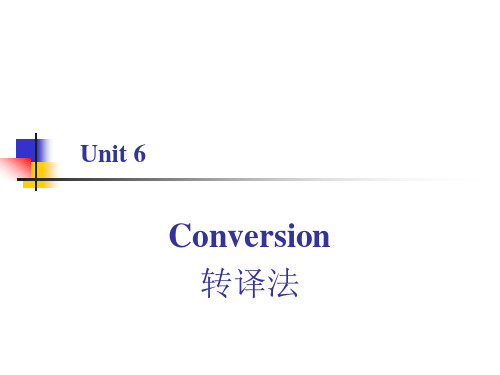词类转译法Conversion
- 格式:pdf
- 大小:182.04 KB
- 文档页数:4




conversion语言学名词解释Conversion语言学Conversion语言学是一门研究语言中的转换现象的学科。
它探究语言中的词类变化、词汇转换及词义转移等现象。
以下是与Conversion语言学相关的名词及其示例解释:1. Conversion(词类转换)•定义:词类转换是通过改变词的词形或词义来将一个词从一个词类转换为另一个词类的语言现象。
•示例:–“water” (名词)可以通过转换为动词形式“to water”(动词)来表示”给植物浇水”的动作。
2. Zero-derivation(零派生)•定义:零派生是一种词类转换形式,它通过改变词的词法特征来将一个词从一个词类转换为无任何词形变化的另一个词类。
•示例:–“to email” (动词)通过零派生转换为“email”(名词)来表示”电子邮件”。
3. Back-formation(逆构词)•定义:逆构词是从某个词的派生词中移除词缀,从而形成一个新的词。
•示例:–“editor” (名词)通过逆构词转换为“edit” (动词)来表示”编辑”的动作。
4. Suppletion(替代派生)•定义:替代派生是一种通过改变词的词根或词干来进行词类转换的形式。
•示例:–“good” (形容词)通过替代派生转换为“the good”(名词)来表示”好的人或事物”。
5. Metonymy(转喻)•定义:转喻是一种通过语义转移将词从原本的意义转换为与其有关的其他意义的语言现象。
•示例:–“crown” (皇冠)通过转喻转换为“the monarchy”(君主制)来表示”国家的王权”。
6. Synecdoche(提喻)•定义:提喻是一种通过将一个词代表的整体改为代表其一部分,或者将代表一部分的词改为代表整体的语言现象。
•示例:–“bread” (面包)通过提喻转换为“food” (食物)来表示”食物的一种”。
7. Conversionalization(语言化)•定义:语言化是指将某个词或短语从其他语言借用并转换为与本土语言相适应的语言现象。


Teaching PlanI. Teaching contentsA. Conversion between different parts of speechB. AmplificationC. OmissionII. Aims of teachingTo make students skilled in word translation.III. Teaching FocusStudents’ ability in dealing with the techniques.IV. Teaching MethodDiscussion (group work, then class work).V. Teaching procedures在翻译过程中,如果绝对地按照原语的词性进行翻译,有时译文会显得晦涩或不符合译语的表达习惯。
这时,我们可以对原语的词性进行转换翻译。
英译汉中常见的词性转换有以下几个方面。
1. 转译为动词1.1 名词转译为动词A) 一些习语中的主体名词可以转成动词,如:这类习语有:have a rest, go for a walk, bear a resemblance to , catch a look, make a claim to, pay attention to, have an effect on, in answer to, by means of, with a view of, for lack of, in accordance with, on account of, in proportion to, at the expense of1. We wouldn’t have any idea when the boy was born.我们不可能知道这孩子是什么时候出生的。
2. I will not only forgive your infidelity to me but will do you all the service I can.我不但原谅你对我的不忠实,还要尽力为你效劳。
翻译技巧4词类转译法英语与汉语的一个显著差异:英语呈静态;汉语呈动态从词汇用法上,英语中常用抽象名词、动词的同源名词、同源形容词、副词及介词等来表达动态含义。
而汉语的动词由于无形态变化,若要表示动作意义,往往只能采用动词。
Don’t believe him.You should know he is a good kidder.不要相信他。
你应该知道他很会骗人的。
I’m doubtful whether he is still alive.我怀疑他是否还活着。
Mother is on the telephone with father.母亲与父亲在通话。
一、词类的转译(一)英语名词的转译1.英语名词—〉汉语动词nominalization)成为英语使用中的普遍现象,构成了静态为主的语言特征。
而汉名词化(nominalization语是逻辑性语言,不受动词形态变化的约束,使用较多的动词,形成了明显的动态优势。
英译汉的过程就是在译文中强化原文动态色彩的过程,常常需要英语名词转换成汉语动词。
(1)具有动作意义的名词(action nouns)例1.I’m convinced that China’s WTO membership will do more contributions to the development of global economy.我坚信中国加入WTO将会对全球经济发展做出更大贡献。
例2.Parents’love of children is perfect and minute.(n.+of)父母爱子女无微不至。
English.(n.+of短语)例3.There is no shortcut to the mastery of English掌握英语无捷径。
(2)有些与感官动词(see,hear,think,know等)相联系的名词(sight,sound,glance,view, knowledge等)通常转译成动词。
例1.The sight and sound of our jet planes filled me with special longing.看到我们的喷气式飞机,听到隆隆的机声,我的心里充满特别的向往之情。
例2.Some knowledge about the structure and history of Chinese is helpful for the study of the language.了解一下汉字的结构和发展史,对学习汉语是有帮助的。
(3)某些由动词作词根+er/or构成的名词,当它不表示个人的职业,而具有较强的动作意义时,可将其转译为动词。
例1.Professor Wang was the instructor of our experiment.王教授指导我们做实验。
例2.He is a good eater and a good sleepersleeper.他能吃能睡。
例3.Those photos served as a reminder of my childhood.那些照片使我想起了童年。
例4.I am afraid I can’t teach you swimming.I think my little brother is a better teacher than I.恐怕我不能教你游泳。
我想我的小弟弟比我教得更好。
(4)构成动词短语的中心名词have a look,have a glance at,have a love for,take care of,take notice of,pay attention to,make use of,give approval to等例1.He had a good knowledge of chemistry.他精通化学。
stop.例2.Please don’t get on or off the bus before it comes to a full stop在车没有完全停稳之前,请不要上下车。
(5)由弱化的动词结构there be+名词也能表达动态含义As Shanghai becomes increasingly congested and polluted,there has been a growing realization that action is needed to tackle these problems.随着上海变得越来越拥挤,污染问题日益严重,人们更加意识到需要采取行动来解决这些问题。
2.英语名词—〉汉语的形容词形容词派生来的名词例1.We are deeply convinced of the correctness of this policy and firmly determined to pursue it.我们深信这一政策是正确的,并决定继续奉行这一政策。
例2.Australian guests are immensely impressed by the splendor and warmth of our reception at the airport.澳大利亚客人对于我们在机场所给予的盛大热情的接待,深表感谢。
3.英语名词—〉汉语的副词The delegates at the conference unanimously expressed their determination to oppose hegemonism on the part of the two superpowers.会上,代表们一致表示坚决地反对两个超级大国的霸权主义。
(二)英语形容词的转译1.英语形容词—〉汉语的动词(1)由动词派生来的形容词,尤其以-able,-ible为后缀的形容词动作意义明显work---workableavail---availableconvert---convertibleapply---applicabledispose---disposable这类形容词使用频率高,能贴切地体现出汉语的动词意义.。
译为“可……”,“适合…..”dismissible,so don’t take it to heart.她的话无足轻重,不要太往心里去。
例1What she said is dismissible不相容。
Water is incompatible with fire.例2水火不相容例3The State Department’s top-ranking Asian specialist said Monday that China’s opening to the West is a helpful policy that should be encouraged by close ties with the United States.国务院最高级的亚洲问题专家星期一说,中国向西方开放的政策是一项好政策,应该通过加强中国同美国的关系来加以鼓励。
(2)表示心理活动和状态的形容词(confident,certain,angry,aware,optimistic,anxious,guilty, delighted,reluctant等)例1.Doctors have said that they are not sure they can save his life.医生们说他们不敢肯定能否救得了他的命。
持乐观的态度。
例2.对中美关系的未来我持乐观的态度I’m very optimistic about the future development of Sino-US relations.(3)以-ed,-ing结尾的形容词常与be动词或其他弱化动词连用,具有明显的动态特征excited/enlightening/pushing/relieved/determined/rewarding/embarrassing/well-intentioned等松了一口气。
例1知道他已经安全地到达美国,我终于松了一口气Knowing that he had arrived in the US safely,I was greatly relieved.例2Saud was a frustrated man at that time.沙特那时已受挫折。
2.英语形容词—〉汉语的名词hypocritical.我们大家认为他是一个十足的伪君子。
例1.Most of us think him very hypocriticalflexible,and can do a greater variety of jobs.例2Computers are more flexible计算机的灵活性较大,因此,能做更多不同的工作。
3.英语形容词—〉汉语的副词例1.There is a big increase in demand for all kinds of consumer goods in every part of our country.目前,我国各地对各种消费品的需求已大大增加。
例2She was concentrating herself too thoroughly---what she did really required less mental andphysical strain.她的注意力集中得过分了——她做这工作,精神上肉体上都用不着那样紧张的。
例3.We must make full use of the natural resources available.我们应当充分利用现有的自然资源。
(三)英语动词的转译1.英语动词—〉汉语的名词例1.Quick decision characterized him.当机立断是他的特点。
例2.Our age is witnessing a profound political change.我们的时代是深刻的政治变化的见证。
例3.Gases differ from solids in that the former have greater compressibility than the latter.气体和固体的区别在于气体的可压缩性比固体的大。
2.英语动词—〉汉语的副词例Underground water reserves are much larger than those on the surface,but as they are unseen we tend to underestimate them.地下水的储量比地表水大得多,但是由于看不见,人们往往会低估地下水的储量。